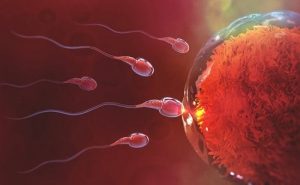
30 Sep Boost your fertility with nutrition
Infertility is a growing problem worldwide. According to WHO (World Health Organization), it is defined as “a disease of the reproductive system”, when a couple can’t conceive after one year or more of trying to. 1
Despite what one might believe, fertility problems are a relatively common condition. According to Australian statistics, one in 35 men will have a fertility issue, whilst one in 25 males are thought to suffer from low sperm count. On the other hand, it is known that women make up around 40 percent of all the treated infertility cases in Australia, and those over the age of 35 have a one in three chance of having fertility issues. 2
WHAT CAUSES INFERTILITY?
There are a lot of factors that can mess up your reproductive system and contribute to infertility problems in both men and women. Sometimes they can be common and known causes like advanced age, ovulation disorders (which can be caused by polycystic ovary syndrome (PCOS) or endometriosis), and in men, factors related to sperm function. In many other cases, the reasons for the inability to conceive are unknown.3

We also know that the environment can disturb our reproductive health, for example, exposure to pollutants and the so-called endocrine disruptors such as Bisphenol A (BPA) and pesticides can increase the risk of infertility in women, and lower sperm concentrations and sperm quality in men. 4
Additionally, many literature studies highlight the role of nutrition and a person’s nutritional status when we talk about fertility and the chances of one getting pregnant.
So, is there really something like a fertility diet? Can nutrients or the woman or male’s nutritional status impact or boost fertility?
WHERE NUTRITION IMPACTS INFERTILITY
Among the factors that can influence fertility, nutrition plays a key role. Dietary deficiencies and your nutritional status, including weighing too much or too little can also adversely affect your reproductive function. For example, a study found that being not only overweight but also underweight increases the time to conceive. This means that a woman with a healthy weight has more chances of getting pregnant in a shorter period of time compared to women who are under or over-weight5. On the other hand, obesity is associated with significant alterations in ovulation and it will also reduce the chance of pregnancy in women who ovulate regularly. 6
For example, a study found that being not only overweight but also underweight increases the time to conceive. This means that a woman with a healthy weight has more chances of getting pregnant in a shorter period of time compared to women who are under or over-weight5. On the other hand, obesity is associated with significant alterations in ovulation and it will also reduce the chance of pregnancy in women who ovulate regularly. 6
When we say that obesity impacts fertility, this is not only for women! Kort and colleagues discovered in their research that excess weight influences sperm quantity and quality in men. 7 ,2
Given this, both men and women, who are overweight or obese will benefit from achieving a normal and healthy weight to improve fertility. (Check out my blog on “Dieting: Is it mind over matter?”)
WHAT IF I HAVE POLYCYSTIC OVARIAN SYNDROME (PCOS) OR ENDOMETRIOSIS?
PCOS is a reproductive disorder which affects about 6-10% of the female population in developed countries. It’s also a leading cause of infertility in women. 8 However, if you’ve been diagnosed with PCOS, there are some lifestyle and dietary interventions that might help your chances of getting pregnant, as well as improving your health, which you can discuss further with a Women’s Health and Maternity Dietitian such as myself. 9
If you have endometriosis, you need to have a diet rich in antioxidants, like those found in leafy green vegetables and fresh fruit, limit red meat consumption, and avoid alcohol intake. This is because your body is in a state of chronic inflammation and anti-oxidants will help to reduce some of those symptoms. For both, PCOS and endometriosis it is important to maintain a healthy weight as well. 10
WHICH NUTRIENTS OR FOOD CAN BOOST YOUR FERTILITY?
You might be wondering by now what you should eat if you’re trying to become a parent. The so-called “fertility diet” has not been established yet, however, there is some interesting information about how some dietary choices can help in infertility cases due to ovulatory disorders, which accounts for about one quarter or more of all cases of infertility.
Here, a group of researchers analyzed the findings from the Nurses’ Health Study, and they found that women who followed a specific diet pattern or made some dietary choices had a lower risk of infertility due to disordered ovulation11. These findings have been confirmed by other studies 12 ,13,14 .
SO WHAT CAN YOU DO TO IMPROVE YOUR DIET?
- Supplementation of vitamin D and chromium might be needed, as they can improve glycemic control and insulin resistance. So, talk to an Accredited Practicing Dietitian, like myself, as I may need to prescribe specific supplements you might need and the right dose for you. (You can also read more about Vitamin D in my blog “Vitamin D: How much does it matter in pregnancy and breastfeeding”).
- Surprisingly, high-fat dairy products might actually be better for fertility issues than low-fat dairy foods. Skim milk dairy products may increase the risk of ovulatory infertility whereas intake of high-fat dairy foods will have the opposite effect.
- Remove trans-fats from your diet and increase your intake of monounsaturated fat, like the ones we find in plant foods, such as nuts, avocados, and olive’s.
- It is best to include foods rich in vegetable protein in your diet, which are also a good source of non-heme iron foods, like grains and legumes. Consumption of red meats and chicken or turkey have been associated with a higher risk of ovulatory disorder infertility. If you have concerns about your iron levels, contact me about what iron supplements to take, as iron deficiency is a very common problem during pregnancy and breastfeeding that can also impact your chances of fertility and your future child.
- The amount and quality of carbohydrate in the diet may be important for ovulation and fertility. Try to eat foods high in fibre, and avoid high glycaemic index (GI) foods like sweets, processed cereals or white bread. Low GI foods are found in most fruits, vegetables, and whole grains.
- Try to eat small and frequent meals, particularly with PCOS.
And finally, don’t forget about vitamins and antioxidants; especially vitamin D and E and folate, which have been linked with positive effects on reproductive health. 4 Just, keep in mind that before you start taking any supplement, it’s best to discuss it with an Accredited Practicing Dietitian.
FINAL WORDS
If you and your partner are trying to become a parent, the best advice is to eat a healthy diet at least 3 months prior to conceiving. Eating a healthy diet is a good idea for anyone and is advised to everyone. So, ask yourself what you’re eating and if you’re consuming plenty of nutrient dense foods in order to keep your body balanced.
All the recommendations above are available to almost everyone, and it’ll be the beginning to a healthy pregnancy! Making sure that the foods you are putting in your mouth are nourishing your body to its optimum is one of the most important things you can do for you and your future child, as I have discussed previously in the blog “Eating Right for the next generation (Nutrigenetics)”.
If you need to make sure your body is ready to conceive OR you’ve been having trouble conceiving, please contact Growth Spectrum, so that we can determine if there are any deficiencies, a need to supplement or to adjust your diet to be ready for the rewarding journey towards parenthood.
REFERENCES:
1. World Health Organization. (2018). Infertility definitions and terminology. [online] Available at: http://www.who.int/reproductivehealth/topics/infertility/definitions/en/ [Accessed 10 Sep. 2018].
2. Fertilitysolutions.com.au. (2018). Infertility Statistics and Facts For Australian Couples | Fertility Solutions. [online] Available at: https://fertilitysolutions.com.au/infertility-statistics/ [Accessed 10 Sep. 2018].
3. Obgyn.ucla.edu. (2018). What is Infertility: Infertility Causes, Treatment, Infertility Doctors – UCLA. [online] Available at: http://obgyn.ucla.edu/infertility [Accessed 10 Sep. 2018].
4. Balabanič D, Rupnik M, Klemenčič AK. Negative impact of endocrine disrupting compounds on human reproductive health. Reprod Fertil Dev. 2011;23(3):403-16. doi: 10.1071/RD09300.
5. Collins, G. and Rossi, B. (2015). The impact of lifestyle modifications, diet, and vitamin supplementation on natural fertility. Fertility Research and Practice, 1(1).
6. Shaum, K. M., &Polotsky, A. J. (2013). Nutrition And Reproduction: Is There Evidence To Support A “Fertility Diet” To Improve Mitochondrial Function? Maturitas, 74(4), 309–312. http://doi.org/10.1016/j.maturitas.2013.01.011
7. Kort, H. (2006). Impact of Body Mass Index Values on Sperm Quantity and Quality. Journal of andrology, 27(3), pp.450-452.
8. Barthelmess, E. K., & Naz, R. K. (2014). Polycystic ovary syndrome: current status and future perspective. Frontiers in Bioscience (Elite Edition), 6, 104–119.
9. Rondanelli M, Perna S, Faliva M, Monteferrario F, Repaci E, Allieri F. Focuson metabolic and nutritional correlates of polycystic ovary syndrome and update on nutritional management of these critical phenomena. Arch Gynecol Obstet. 2014 Dec;290(6):1079-92. doi: 10.1007/s00404-014-3433-z. Epub 2014 Sep 9. Review.
10. Parazzini F, Viganò P, Candiani M, Fedele L. Diet and endometriosis risk: a literature review. Reprod Biomed Online. 2013 Apr;26(4):323-36. doi: 10.1016/j.rbmo.2012.12.011. Epub 2013 Jan 21. Review.
11. Chavarro, J., Rich-Edwards, J., Rosner, B. and Willett, W. (2007). Diet and Lifestyle in the Prevention of Ovulatory Disorder Infertility. Obstetrics & Gynecology, 110(5), pp.1050-1058.
12. Chavarro, J. E., Rich-Edwards, J. W., Rosner, B. A., & Willett, W. C. (2009). A prospective study of dietary carbohydrate quantity and quality in relation to risk of ovulatory infertility. European Journal of Clinical Nutrition, 63(1), 78–86. http://doi.org/10.1038/sj.ejcn.1602904
13. Chavarro JE, Rich-Edwards JW, Rosner B, Willett WC. A prospective study of dairy foods intake and anovulatory infertility. Hum Reprod. 2007 May;22(5):1340-7.
14. Chavarro JE, Rich-Edwards JW, Rosner BA, Willett WC. Iron intake and risk of ovulatory infertility. Obstet Gynecol. 2006 Nov;108(5):1145-52.



Sorry, the comment form is closed at this time.